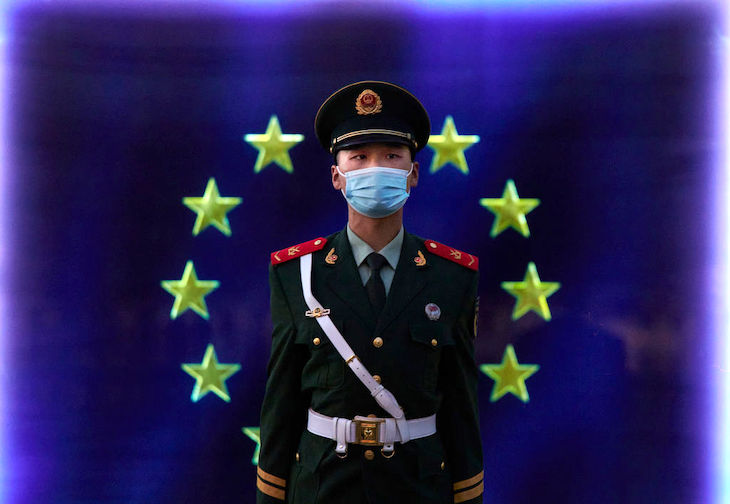The target of Wednesday’s dawn raid has been on the radar of western security services for some time. There has been growing concern that Nuctech, which manufactures airport baggage scanners for European airports and ports, poses a potentially serious risk to national security. But the European Union officials who raided the Warsaw and Rotterdam offices of the Chinese company this week were far more interested in the company’s spreadsheets, as they searched for evidence of unfair trade practices.
It’s easy to see a touch of the Al Capone in Wednesday’s raid, which was by competition officials
Nuctech is part-owned by the Chinese government and was once run by the son of former Chinese leader Hu Jintao. It has been blacklisted as a security threat in the United States, and supplied devices to Spanish, Italian and Swiss airports, as well as to the port of Rotterdam, where they are used to check on containers, luggage and parcels leaving the European Union. Fears have been growing for some time about the company’s capacity for espionage and sabotage. In 2021, Lithuania blocked a subsidiary of the company from supplying its airports, citing national security grounds.
It’s easy to see a touch of the Al Capone in Wednesday’s raid, which was by competition officials – much like how the FBI could only convict America’s most famous gangster of tax evasion. The EU officials were armed with new anti-foreign subsidy rules that strike at the heart of the way many Chinese companies do business. The ramifications are far-reaching, coming soon after the EU launched probes into Chinese government backing for electric vehicles (EVs), wind energy and solar technologies. Brussels fears that China’s heavy subsidies for its companies is resulting in dumping on European markets at below cost, threatening domestic businesses.
The EU’s foreign subsidies regulation came into force last year, giving Brussels the power to block companies that are subsidised by foreign governments from bidding for public contracts, as well as taking over European companies and even selling goods and services to the single market. It is, in other words, potentially very powerful, but there had been some scepticism about how the legislation would be used – Brussels has traditionally been very cautious about antagonising Beijing.
Instead, competition officials are wielding the new regulation with enthusiasm, with China providing a rich target list. Subsidies go to the heart of Beijing’s industrial policy, with heavy support of (and protection for) industries and technologies in which the Chinese Communist Party wants to lead the world – such as renewables. Among the first targets of the EU’s competition officials was a Chinese train company bidding to supply electric trains to Bulgaria. In response, the company decided to pull out of the tender rather that opening its books. Probes were also announced into tendering by Chinese companies for a solar park in Romania.
Chinese market-distorting subsidies are not new. In his memoire, A Promised Land, former US president Barack Obama wrote that China’s rise was facilitated by systematically ‘evading, bending, or breaking just about every agreed-about rule of international commerce.’ Neither is the EU a stranger to book-keeping with CCP characteristics. When in 2016, China’s state-owned shipping firm COSCO bought a stake in the troubled Greek port of Piraeus, the Chinese company was even more heavily indebted than the port – six times more leveraged by one estimate. It was not a strictly commercial purchase, but a strategic decision to develop what was described as a‘dragon head’, a bridgehead into Europe for China’s Belt and Road Initiative, a vast programme to extend influence through debt-fuelled infrastructure investment. Strategic considerations have also guided many other acquisitions – especially involving technology.
The use of the new regulation to target Chinese companies is part of a wider reappraisal by Brussels of an increasingly hostile China, triggered in part by Beijing’s support for Russia’s aggression in Ukraine and more broadly by Brussels waking up to the dangers of over-dependence on China, especially in key technologies of the future.
The new regulation is especially powerful because investigations can start automatically when a bid is made (they don’t necessarily need a complaint). These investigations are quick and focused – there is a 110 working day deadline from notification that a company is bidding for a contract to a decision on whether it is eligible. That’s far faster than traditional trade defence instruments such as anti-dumping investigations or taking a complaint through a cumbersome international body like the World Trade Organisation, which are more subject to CCP pressure. The competition authorities can also demand an enormous amount of data to identify hidden or overt subsidies – a powerful tool, since CCP-linked entities generally don’t like handing over their data. Trading partners have long complained about the murky finances of Chinese companies, and many of these companies may simply decide, as with the train firm, not to bid rather than be more transparent.
Beijing has of course expressed outrage about this. The China Chamber of Commerce in the EU has accused Brussels of ‘weaponsing’ anti-subsidy investigations in order to ‘supress’ Chinese companies and of launching ‘unjustifiable dawn raids’. There have been dark threats of retaliation. That is rather like an extremely dark pot calling the kettle black, so routine is the CCP’s bullying of foreign companies.
This raid comes at a difficult time for Beijing, which sees the export of its heavily-subsidised renewable energy technologies, including EVs and solar, as a way of rebooting its beleaguered economy. Perhaps the ultimate power of the new rules lies in their being technocratic in nature. The EU can argue that it isn’t targeting Beijing, but simply enforcing standards to ensure a fair and transparent playing field – all of which just happens to be anathema to the way most CCP-linked entities have traditionally done business.







Comments